Thursday, July 31, 2008
In him all things hold together
Colossians 1:15-20
"[Jesus] is the image of the invisible God, the firstborn of all creation. For by him all things were created, in heaven and on earth, visible and invisible, whether thrones or dominions or rulers or authorities—all things were created through him and for him. And he is before all things, and in him all things hold together. And he is the head of the body, the church. He is the beginning, the firstborn from the dead, that in everything he might be preeminent. For in him all the fullness of God was pleased to dwell, and through him to reconcile to himself all things, whether on earth or in heaven, making peace by the blood of his cross."
(Tip of the biretta to Meredith Killingsworth.)
Monday, July 28, 2008
Picturing Lambeth saved by amazing grace
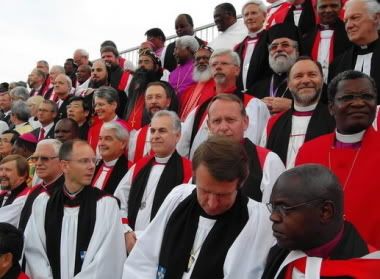
Each Lambeth Conference has a group photo taken. This time around, as the Anglican bishops were getting into position on the bleachers, they broke out into song. More specifically, they sung that old hymn "Amazing Grace," written by that former servant of a slave trader turned Anglican priest and abolitionist John Newton. The Lambeth Daily has a slide show here with the audio. The last photo includes my own bishop (above).
As we are getting into the latter days of the conference, difficult issues are beginning to be addressed head-on. The latest news is about the Windsor Report Continuation Group. Their recommendations about where we go from here is in their observations, which can be viewed here. The transcription of the press conference is here.
The bottom line seems to be that (consistent with the statement of the last Lambeth Conference) all same-sex blessings/marriages and ordinations of non-chaste candidates must stop as well as the jurisdiction crossings by other dioceses and provinces. In other words, the Windsor recommendations must be fully complied with in order for the churches of the Anglican Ccommunion to have a future together. Many TEC bishops were reportedly not happy.
Bishop Iker has an audio interview with Sarah Hey, posted here on Stand Firm. He notes in conclusion that while the prospect for results do not appear promising, "Nonetheless, it is a good proposal. I think we ought to welcome it, and cooperate with it as much as possible."
Sunday, July 27, 2008
Thursday, July 24, 2008
"Understandable and doable"
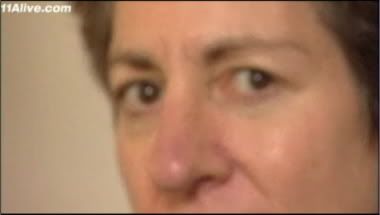
You are not going to believe this one. When asked by WXIA reporter Dennis O'Hayer about her view on whether departing congregations should keep their property, Presiding Bishop Katharine Jefferts Schori said that if they were going to a church that is in communion with TEC, that would "be understandable and doable." The relevant clip is with about 2:30 minutes left in this interview.
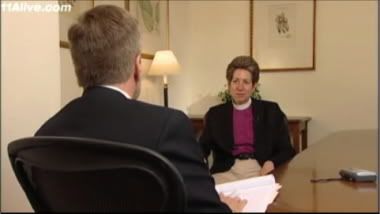
O’Hayer: "Court battles have started. Virginia has had a case where the congregation that left got to keep the property, at least in the lower court ruling. Would you rather have those properties sold, than go with the congregation that leaves the [Episcopal] Church?"
Schori: “The issue that’s often not understood is that bishops and officers of dioceses have a moral and a fiduciary responsibility to see that the legacy of the church, the assets of the church, are used for the purposes for which they were given. When a congregation, or members of a congregation, or a priest decides that he wants to set up as another church that’s not in communion with this church, we really don’t have the right to give that property away, give those assets away. If it’s another . . . you know, if it were a church with whom we are in full communion, like the ELCA, that would be much more understandable and doable. In the absence of that kind of full communion relationship, we really don’t have a choice. Our task is to see that the assets of the church are used for the ministry of the Episcopal Church.”
That should be good news for Bishop Schofield and the people of the Diocese of San Joaquin, who left TEC last December for "a church with whom we are in full communion." It is a reassurance to the dioceses of Fort Worth, Pittsburgh, and Quincy who are considering the same move.
Of course, I don't believe that our Katharine has changed her hard-line stance on departing congregations. It is interesting that she mentioned the ELCA as an example of churches with whom we are in communion. Surely other churches of the Anglican Communion would fit this category at least as well, or are we no longer claiming that TEC is a part of the Anglican Communion?
When the time comes for her to take the stand in the next church property trial, she may wish she could take that interview back.
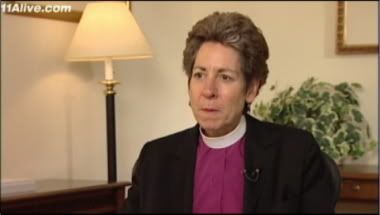
Monday, July 21, 2008
"That's a bit of an understatement"
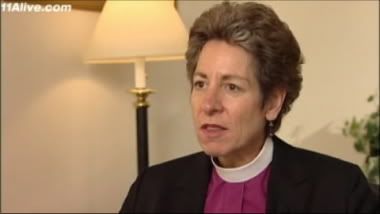
Bishop Schori stated in the above interview (click on picture) with WXIA that Anglicanism has no passion for uniformity. No "passion for uniformity"? There is certainly no idolatry of diversity in the New Testament when it comes to faith and doctrine.
Romans 15:4-6
"Whatever was written in earlier times was written for our instruction, so that through perseverance and the encouragement of the Scriptures we might have hope. Now may the God who gives perseverance and encouragement grant you to be of the same mind with one another according to Christ Jesus, so that with one accord you may with one voice glorify the God and Father of our Lord Jesus Christ."
1 Corinthians 1:10
I appeal to you, brothers, by the name of our Lord Jesus Christ, that all of you agree, and that there be no divisions among you, but that you be united in the same mind and the same judgment.
Ephesians 4:4-5, 11-16
"There is one body and one Spirit—just as you were called to the one hope that belongs to your call—one Lord, one faith, one baptism, one God and Father of all, who is over all and through all and in all. . . . And he gave the apostles, the prophets, the evangelists, the shepherds and teachers, to equip the saints for the work of ministry, for building up the body of Christ, until we all attain to the unity of the faith and of the knowledge of the Son of God, to mature manhood, to the measure of the stature of the fullness of Christ, so that we may no longer be children, tossed to and fro by the waves and carried about by every wind of doctrine, by human cunning, by craftiness in deceitful schemes. Rather, speaking the truth in love, we are to grow up in every way into him who is the head, into Christ, from whom the whole body, joined and held together by every joint with which it is equipped, when each part is working properly, makes the body grow so that it builds itself up in love."
Philippians 2:1-2
"So if there is any encouragement in Christ, any comfort from love, any participation in the Spirit, any affection and sympathy, complete my joy by being of the same mind, having the same love, being in full accord and of one mind."
Certainly there is (or ought to be where there is not) a passion for uniformity in doctrine in Anglicanism. What is particularly Anglican is the reality that such a pursuit is a struggle.
You can find part one of the full interview here. Part two is here.
Thursday, July 17, 2008
Arriving at Lambeth
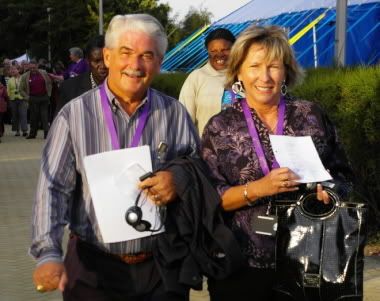
"I'm here to represent" says the Bishop of Fort Worth and his wife Donna as the Lambeth Conference attendees arrive.
Source
Links for following Lambeth news:
Anglican Communion News Service
Anglican TV
BBC News
Christian Challenge
Episcopal Life/ENS
George Conger
Integrity USA
Lambeth Daily
The Living Church
Ruth Glendhill
Stand Firm
TitusOneNine
VirtueOnline
Wednesday, July 16, 2008
Look 'em in the eye
Well, it's a little more complicated. First of all, if you are more than five feet away, you are really just looking someone in the face. And that's where you'd be looking anyway if you are carrying on a conversation. Up close, however you can look someone in the eye. But then I think, which eye? The right or the left? Will I be darting back and forth? Maybe I should look in between the eyes.
Unless I'm thinking about it, I tend to look people in the mouth when I'm up close. Why? It's not because I'm hard of hearing, but it's just because that's what is talking back to me. Anyone else do the same?
Tuesday, July 15, 2008
Old priests and young priests
"We [older clergy] shall probably need to be a little less slavishly Roman: we shall need to be a bit more RSV and a bit less Jerusalem bible; a bit more on with fine liturgical music and a bit less indebted to 1970s folk masses; a bit more damask and a bit less polyester. It will require some of us older priests, brought up with Vatican II reforms, to be more patient and understanding towards some of the younger priests, with their maniples and miraculous medals. They come from a different culture, an age of heritage and retro, not an age of lunar landing and futurism."
Speaking truth to power
Foreseeing that the Bishop of New Hampshire would be a speaker of interest and a controversial figure, the Archbishop of Canterbury barred him from preaching or celebrating the Eucharist in his province. Episcopal Cafe reported:
"Citing fears of creating a controversy, Rowan Williams, the Archbishop of Canterbury has refused to grant Bishop Gene Robinson of New Hampshire, the right to preach or preside at the eucharist in England. Robinson received the news in an email yesterday morning.
Sources familiar with the email say Williams cites the Windsor Report and recent statements from the Primates Meeting in refusing to grant Robinson permission to exercise his priestly functions during his current trip to England, or during the trip he plans during the Lambeth Conference in July and August."
Well, he decided to anyway. Sure enough, it was an occasion of controversy. A young man boldly stood up like a modern day John the Baptist, speaking truth to power and calling the bishop (who is supposed to be an example to the flock) to repentance. You might call it a diaconal ministry, as the deacon is the one who calls us to confession. The BBC reported:
"As Bishop Robinson began his sermon a member of the congregation repeatedly called him a 'heretic' and said 'repent, repent, repent'. He began his sermon by saying how sad it was that the Anglican Communion was tearing itself apart. But he was stopped when the man in the congregation shouted that the schism was the bishop's fault."
You can read the whole story and see the video here. Katie Sherrod has posted her account of the event for Integrity USA here.
Next Sunday, 20 July, Bishop Robinson will be at a Eucharist at St Stephen's in Canterbury co-sponsored by the LGBT advocacy groups Changing Attitudes and Integrity. We have yet to see what his role will be this time. But I'm sure there will be controversy.
Monday, July 14, 2008
Mobilizing the Faithful
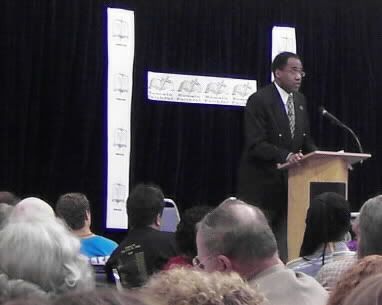
Dr Michael Howell delivers the keynote address.
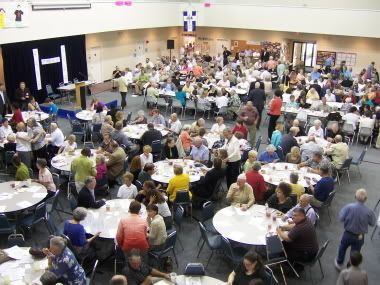
A capacity crowd gathers at Ss Peter and Paul in Arlington.
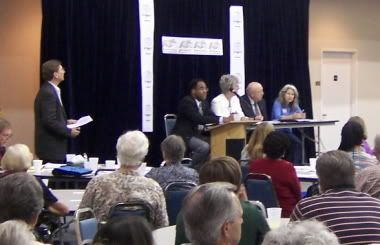
Remain Faithful spokesperson and Trinity, Fort Worth parishioner Cora Werley addresses a question during the panel discussion.
Melisa and I attended the Remain Faithful event on Saturday. I think it was a real blessing to her and I quite enjoyed seeing the laity making their voices heard. We began with a votive Mass for Christian missions at Ss Peter and Paul in Arlington. Dr Bill Dickson from St Andrews, Fort Worth gave the sermon on the Great Commission. I only wish there had been enough room for everyone in the church.
I am told that they expected 150, so they prepared for up to 300 (just in case). But then 400+ showed up. It was a nice problem to have. According to a board member, St Alban's has the most members of any one parish (at least of a week ago).
Dr Howell was very good in his keynote address in the Great Hall. I could have listened all day. We did go more than 2 hours over the scheduled time, but everyone seemed pleased. My thanks to the laypeople who put this together. Keep up the good work.
Friday, July 11, 2008
I'm not finished yet
To give you an idea, I have compiled a list for you (in no particular order). I have not included books that would not normally be completely read, such as reference books, text books, or collections of essays and other compilation .
Listening to the Past: The Place of Tradition in Theology, by Stephen Holmes
Christ: The Experience of Jesus as Lord, by Edward Schillebeeckx
Common Witnesses to the Gospel, Ed. by Jeffrey Gros, et al.
An Outline of Biblical Theology, by Millar Burrows
The Everlasting Hatred: The Roots of Jihad, by Hal Lindsey
The History of the Church in England, by J. R. H. Moorman
Hail, Holy Queen, by Scott Hahn
Revelations of Divine Love, by Lady Julian of Norwich
Celibacy in the Early Church, by Stephen Heid
About Being a Priest, by Frederico Suarez
The Unity We Seek, by Robert Runcie
The Practice of the Love of Jesus Christ, by Alphonsus Liguori
Three to Get Married, by Fulton Sheen
The Memoirs of Cleopatra, by Margaret George
The Signature of God, by Grant Jeffrey
What if the Bible Had Never Been Written? by James Kennedy
The Gnostic Gospels, by Elaine Pagels
The Divine Commission, by Frank Wilson
Church Building and Furnishing, J. B. O'Connell
Love and Responsibility, by Karol Wojtyla
The English Church and the Papacy in the Middle Ages, by C. H. Lawrence
The Theology of the Body, by John Paul II
The Birth of the Messiah, by Raymond Brown
Women in the Priesthood? by Manfred Hauke
Defence of the Seven Sacraments, by Henry VIII of England
Liberal Fascism, by Jonah Goldberg
Tuesday, July 08, 2008
Canonical Exams

Since I serve on the Commission of Ministry (Committee for Diaconate), I'm pushing the group to revamp our canonical exams. I think they should be much more intensive and a lot more fun (except for the candidates, of course). I thought we'd have family and friends present, plus a crowd of parishioners. Then we'll make sure we include some of the most probing and embarrassing questions imaginable (that's okay, we'll just label those "moral theology"). If they answer all the questions truthfully, they can be ordained. It would probably look something like this . . .
I know Fr Hightower will be with me on this because he loves a good show. I don't think the chair, Deacon Lana, will go for it though. She's worried that there will be no ordination candidates.
Monday, July 07, 2008
General Synod took action on innovation
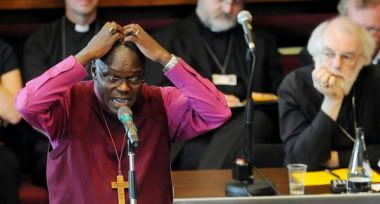
Today, General Synod considered action on the measure for the consecration of women to the episcopate in the Church of England. Along with that discussion was consideration of options for traditionalists. The Archbishop of Canterbury criticized the measure without traditionalist protections as "marginalizing" traditionalists and current proposals for traditionalist protections as "structurally humiliating" for future women bishops. The principle of ordaining women as bishop was already affirmed at a previous synod. This debate was over care for the minority, which was not forthcoming. No Anglo-Catholic ghetto will be created. Massive defections, as took place in 1992, appear to be likely. Here are a few links to follow the story:
A decent summary by the New York Times
AFP Newswire
General Synod home
Audio of Synod debate, Part One
Audio of Synod debate, Part Two
Audio of Synod debate, Part Three
Ruth Glendhill's liveblogging of the debate
In her last update, Glendhill noted:
So that's it! Unless the laity throw the whole thing out in the final vote at 10.30, admittedly a possibility, the rest of the amendments concern merely the code of practice. What this means is that the Church is going to move towards the ordination of women bishops with a code of practice, with the draft legislation now to be drawn up to be considered in February next year. It's not over long-term of course. The legislation will have to get a two-thirds majority in each house when it reaches the final vote in two or three years time. The narrowness of the vote on this motion shows just how close it could be and of course the women priests vote in 1992 only went through when one lay traditionalist woman crossed the house and voted for woman priests instead of against at the very last minute.
More debate after dinner with the final amendments, but women are going to be bishops and there will be a national code of practice for the trads. Christina Rees welcomed it as the 'lesser of two evils' and said the women would accept and work with the code of practice. The former Archdeacon of York, Ven George Austin, who was watching the debate, has just left, almost in tears. He will stay in the CofE, as long as he has somewhere to worship. 'If I had been a serving priest, I couldn't have stayed.' I hear rumours of a protest walk-out planned by 100-or so trads at the end of the sessions this evening. And of course there will be more meetings in Rome, more plotting. Father David Houlding said: 'It is getting worse. It is going downhill very badly. It is quite clear there is a pincer movement and we are being squeezed out.
Forward in Faith--UK issued this response:"The consistent behaviour of the General Synod compels Forward in Faith and the Catholic Group in General Synod to recognise that, without intervention by the House of Bishops, there is little prospect of gaining a synodical majority which would provide a structural solution that would meet the needs of those who, out of obedience to scripture and tradition, are unable in conscience to receive the ordination of women to the episcopate. We will in the coming days continue to explore all possible avenues which might secure our corporate ecclesial future and look to our bishops to facilitate this."
A nice BBC wrap-up with the Bishop of Fulham
Saturday, July 05, 2008
The gospel of revolution
Who will you turn to now for direction? There are no presidents or vice-presidents, no supreme court justices or public defenders to call on. There are a handful of young, radical lawyers, like the Adams cousins, John and Samuel, but they’re largely concentrated in cities, while you and most of your friends live in the country. In many colonies, including Massachusetts, there are not even elected governors or councilors—they have all been appointed by the British crown and are answerable to it.
Where you turn is where you have habitually turned for over a century: to the prophets of your society, your ministers.
The American Revolutionary era is known as the “Golden Age of Oratory.” What school child has not heard or read Patrick Henry’s immortal words, “Give me liberty or give me death”? Who has not seen reenactments or heard summaries of Ben Franklin’s heroic appearance before a hostile British Parliament? Yet often lost in this celebration of patriotic oratory is the key role preaching played in the Revolutionary movement.
Read the entire article here.

